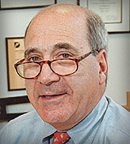David Morse Livingston, MD, formerly the Charles A. Dana Chair in Human Cancer Genetics at Dana-Farber and the Emil Frei III Distinguished Professor of Medicine at Harvard Medical School, died unexpectedly on October 17, 2021. He was Deputy Director of the Dana-Farber/Harvard Cancer Center (DF/HCC) from 2000 to 2019 and was Director and Physician-in-Chief of Dana-Farber from 1991 to 1995. He was a member of the DF/HCC Executive Committee and a member of the Dana-Farber Executive Committee for Research.

David Morse Livingston, MD
Intellect, a Source of Inspiration, and a Signature Laugh
Dana-Farber President and Chief Executive Officer Laurie H. Glimcher, MD, made the following statement:
“When Worcester’s Robert Goddard, the father of space travel, was a boy, he used to sit in his cherry tree and dream about flying to Mars. Much later, a hurricane knocked the tree down and Goddard wrote in his diary, ‘cherry tree gone; have to carry on alone now.’ I think that is how many of us are feeling today: that we have lost not just a source of comfort but a source of inspiration. David Livingston made it possible for us to dream big about the future of Dana-Farber because that was how he saw it, and his unflagging enthusiasm and love for the institution and everyone in it lifted our hearts and spirits every day. Now we have to carry on without him. But surely there is no better way to honor his memory than to do what he spent his life doing.”
In the near half-century that he spent at Dana-Farber, Dr. Livingston held numerous high-level posts and served as a valued mentor to myriad students and junior scientists, including Nobel Laureate William G. Kaelin, Jr, MD, who said in a statement:
“Dr. Livingston was one of the world’s leading scientists, but that only scratches the surface as to why he will be missed. He was a spirited polymath who could fill a room with his intellect and signature laugh. He trained scores of successful scientists and was a coveted advisor to cancer center directors, pharmaceutical companies, and philanthropic organizations around the world. When I entered David’s laboratory in 1988, I was immediately inspired by his intellect and infectious enthusiasm. He methodically sculpted me into a scientist, teaching me how to frame and tackle important scientific questions. And his mentorship didn’t end when I left his laboratory—it continued throughout my career. My eventually winning the Nobel Prize says more about David than it does about me.”
Research Paves the Way for Cancer Prevention
A prominent expert on the molecular origins of breast and ovarian cancers, Dr. Livingston focused his research on genes that regulate cell growth, including the tumor suppressor genes Rb, p300/CBP, BRCA1, and BRCA2. His work has been the cornerstone of many studies of cancer susceptibility linked to BRCA function and mutations. By understanding the tumor suppressive properties of BRCA1 and BRCA2, he paved the way for studying novel approaches to breast and ovarian cancer prevention.
“David Livingston was a giant in cancer research,” said Tyler Jacks, PhD, Founding Director of the David H. Koch Institute of Cancer Research at MIT. “His laboratory’s work helped shape how the field now understands key genetic events in the development of breast cancer and many other cancer types. He was instrumental in bringing together investigators across the whole cancer continuum.”
Greater Boston Background
Dr. livingston was born in Cambridge, Massachusetts, and grew up in Salem. He recently recalled in a Dana-Farber “Unraveled” podcast that he caught the science bug at age 11, when he received a subscription to The New England Journal of Medicine as a gift from a relative. He couldn’t understand the writing, but he liked the pictures and the Massachusetts General Hospital case histories.
He subsequently received his bachelor’s degree, cum laude, from Harvard University in 1961 and his MD, magna cum laude, from Tufts Medical School in 1965. He trained in internal medicine at Peter Bent Brigham Hospital and did his scientific training at the National Cancer Institute and Harvard Medical School. He joined the Harvard and Dana-Farber faculty as Assistant Professor of Medicine in 1973.
“He spent his entire life in the greater Boston area except for two stints at the National Institutes of Health,” said his daughter, Catherine Livingston.
Many Accolades
Among his many awards and achievements, he received the Pezcoller Foundation–AACR International Award in 2017, recognizing his significant contributions to translational cancer research. In 2019, he was recognized for his remarkable 45 years of service to Dana-Farber. Dr. Livingston was a member of the U.S. National Academy of Medicine and the U.S. National Academy of Sciences. He had been a member of editorial boards of numerous scientific journals and authored or coauthored more than 235 published scientific articles, including within the past year.
Mentoring had always been a joy for Dr. Livingston. “There is nothing like watching a person grow, watch them sprout their mythical wings, and begin to think on their own and begin to ask questions that simply take your breath away,” he said in the podcast.
In addition to his wife, Emily, and his daughter, Catherine, of Washington, DC, Dr. Livingston is survived by another daughter, Julie Livingston, of New York City; a stepson, Jeremy Maltby, of Washington, DC, and five grandchildren.

